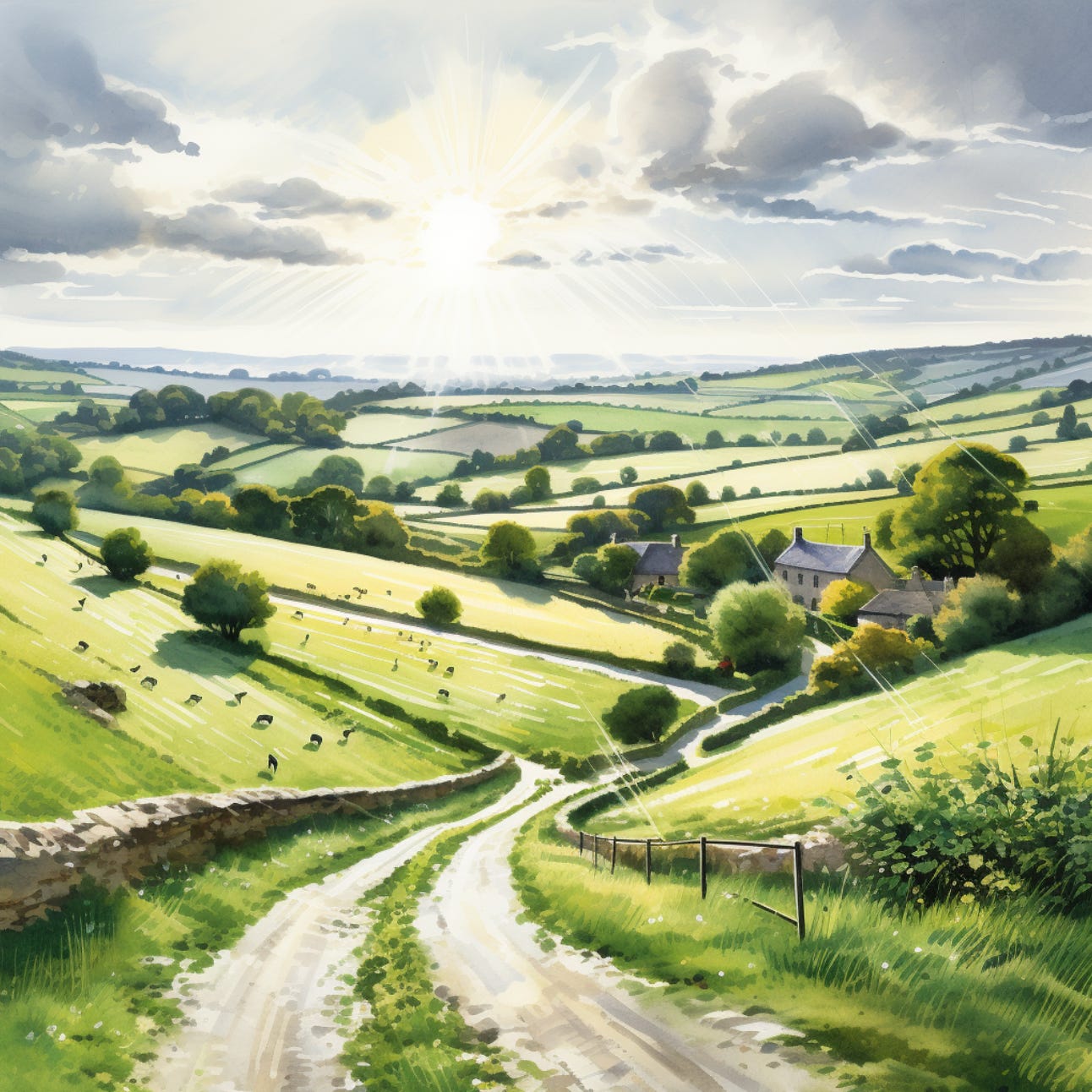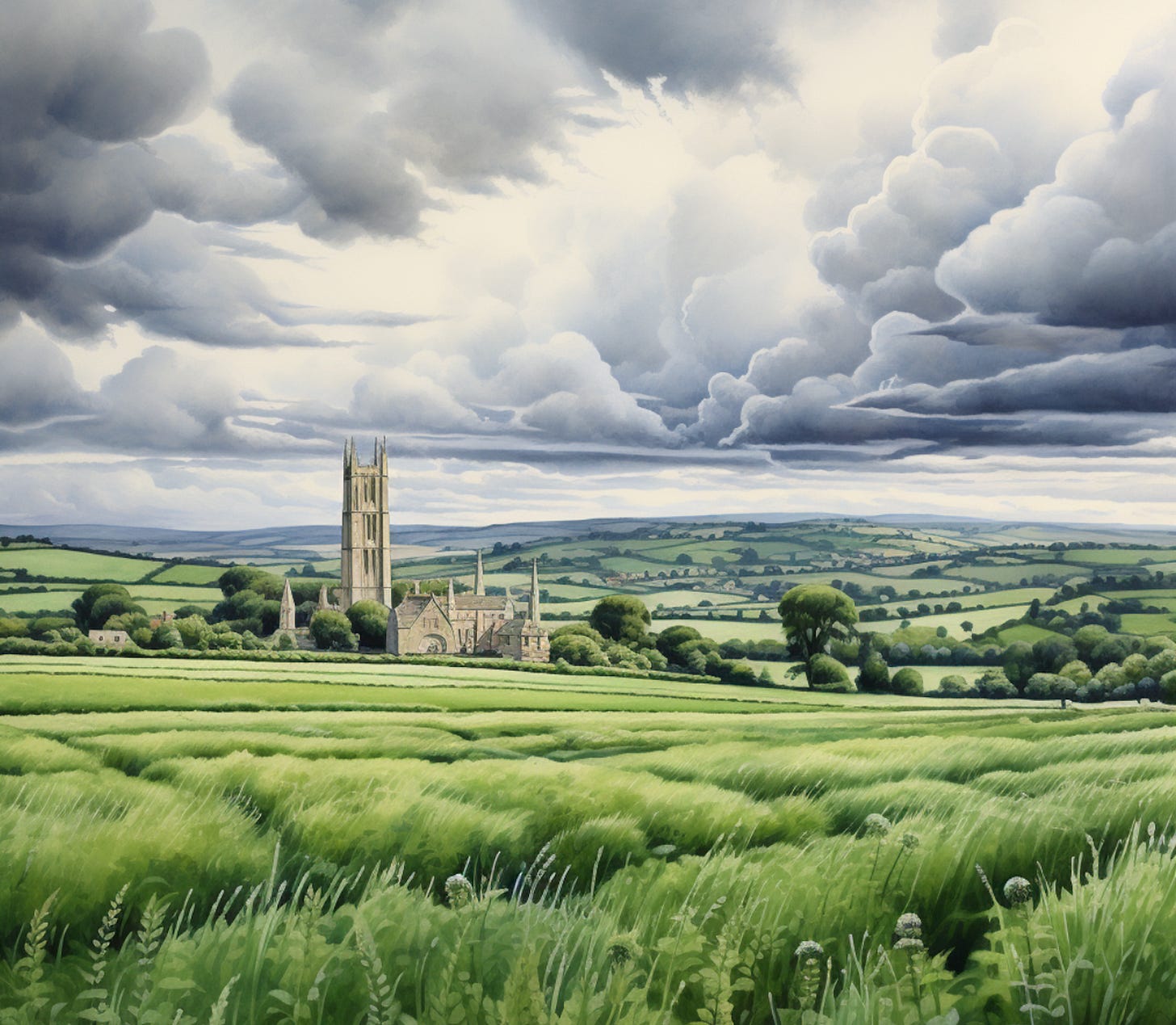Somewhere west of London, the car jerked, startling me from my slumber. A second downshift knocked Aris' sleeping head off my shoulder. Up ahead, a sign pointing right read, "Windy Hollow."
Another downshift and we took the turn, plunging through a tall thicket onto a narrow lane barely wide enough for two vehicles abreast. Our driver accelerated, tacking from one blind curve to the next with a fool's recklessness.
Or was it a sage's calm? I couldn’t be sure. It was the first of many contradictions to ambush me that summer. I braced for impact, but we emerged intact from the tangled wood into the expanse of a new country.
The English Cotswolds rolled before us, a vast green ocean. A heavy mist hugged the ground, pierced here and there by errant sunbeams slicing through a flat white sky. We wound with the road, up, down, and around, careening like a small sailboat slipping across the surface.
I caught the first glimpse of a town from one of the higher crests, a church belfry poking through a thickening fog. The four points of its tower floated majestically above the gloom one moment, sinking out of sight in a dash the next.
Aris started awake -- she'd seen it, too.
We drove on, the town flickering in and out of view like a looping fragment of film. The silence was palpable. We were in that peculiar, in-between space where, fleetingly, one holds a receding here in one hand while simultaneously reaching across to an unknown now with the other. I kept my eyes trained in the town's direction, struggling to reconcile what I’d imagined with the reality at hand.
It had been my idea to spend the summer working abroad. A flier in my university's career center for international student work permits caught my attention, and I immediately thought of Aris.
Every summer worth remembering, I'd spent with her, the first when we were twelve. That was the year my father transferred to New York, and my mother announced we weren't moving with him. It took weeks for them to come clean with me. By the time I realized what was happening, my dad was long gone.
My mom enrolled me in tennis camp and sailing lessons to make up for it. But her pity only elicited snickers from my older siblings, who were all grown and out of the house long before I reached puberty.
They decided I had it too easy. A summer cleaning gutters and mowing lawns was more in keeping with our clan's modus operandi, notwithstanding the sudden brokenness of our home.
I felt like an imposter waiting for the camp van that first June morning, wearing hand-me-down tennis whites gripping a battered racket that had seen better days. "These will do," my mother proclaimed as she fished them from the recesses of our attic with a bravado that declared nothing had changed.
I had spent hours in that attic as a kid excavating the artifacts of my siblings' childhoods. The Teddy bears, homemade Halloween costumes, stacks of 45s, and Playboys hidden by my brothers under piles of National Geographics were a record of a history that, while not my own, felt like my inheritance.
But my dad's abrupt departure changed all that. It ruptured faultlines obvious to them but not yet discernable to me and unleashed a torrent of accusations about his past infidelities that pre-dated my arrival on the planet.
"About time."
"It's for the best."
"You'll be fine," they insisted.
My dad was a cad, end of story.
Although it provided sorely needed context for the current upheaval, it also called into question the reason for my being. Had I been some kind of reset or last-ditch effort who failed in his mission to keep the family together?
I didn't feel like a failure. But with my dad gone, I didn't feel like I belonged anymore, either, not in the tacit way I had.
My mother's happiness had always been my top priority. But I was also very much my father's son. He's the one who named me "Cosmo,” after all. "Cosmo from the cosmos," he'd exclaim! "Your father, the dreamer," my mom would retort, tousling my hair.
It was confusing. I knew nothing of these paternalistic transgressions my siblings preached. As far as I was concerned, they happened a lifetime ago, yet my world was the one that was now irrevocably altered by them.
It didn't help that every attempt I made to discuss the matter was side-stepped: gruffly by my father, "Don't believe everything you hear, Cosmo;" vaguely by my mother, "This has nothing to do with you, honey."
Be careful what you wish for; nature abhors a vacuum.
In the absence of any meaningful dialogue, my parents’ deferrals were just the push I needed. I was twelve years old and ripe for rebellion. I ceased believing my siblings, courtesy of my father. And I concurred with my mother; this did have nothing to do with me.
And so, with no history of my own and a squandered inheritance, I scrambled into the camp van that thick June morning, destined for parts unknown.





![The Summer We Said Goodbye [Installment 2]](https://substackcdn.com/image/fetch/w_280,h_280,c_fill,f_auto,q_auto:good,fl_progressive:steep,g_auto/https%3A%2F%2Fsubstack-post-media.s3.amazonaws.com%2Fpublic%2Fimages%2F5a0eaa74-9bdc-4fe5-a2d7-853d5175868a_1878x1660.png)